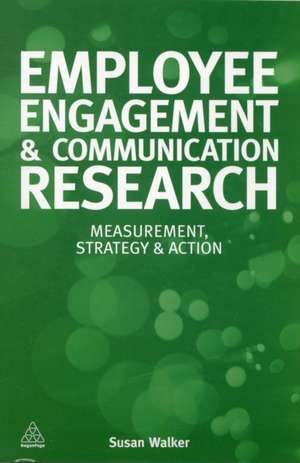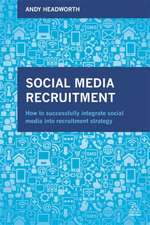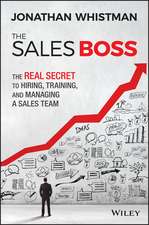Employee Engagement and Communication Research – Measurement, Strategy and Action
Autor Susan Walkeren Limba Engleză Paperback – 2 noi 2012
There's a well-known saying: what doesn't get measured doesn't get done. So it is no surprise that communicators, human resource and change managers recognize the need to measure and evaluate their work, particularly its worth to their organizations.
Susan Walker covers all the tools, strategy and action required to plan a research project or commission external research, whether a full scale employee survey or research focusing on a particular subject area such as communication, engagement, change or corporate social responsibility. She guides readers toward defining their objectives; involving and communicating with employees; choosing a quantitative or qualitative approach; designing and developing questionnaires; maximizing response rates; interpreting the data effectively; turning the results into an organizational story and finally, developing and leading an action program for change. Throughout there is a focus on creating an effective business case and demonstrating value to the bottom line.
Preț: 335.55 lei
Nou
Puncte Express: 503
Preț estimativ în valută:
64.23€ • 69.79$ • 53.99£
64.23€ • 69.79$ • 53.99£
Carte tipărită la comandă
Livrare economică 21 aprilie-05 mai
Preluare comenzi: 021 569.72.76
Specificații
ISBN-13: 9780749466824
ISBN-10: 0749466820
Pagini: 256
Ilustrații: Illustrations
Dimensiuni: 155 x 234 x 14 mm
Greutate: 0.4 kg
Editura: Kogan Page
ISBN-10: 0749466820
Pagini: 256
Ilustrații: Illustrations
Dimensiuni: 155 x 234 x 14 mm
Greutate: 0.4 kg
Editura: Kogan Page
Cuprins
Acknowledgements
Introduction
Conversation 1: Sir Robert Worcester, pioneer of employee research
Part 1: Measurement
01 Defining your objectives
Case study 1: BP Lubricants
Case study 2: Virgin Atlantic
Research from your desk
02 Involving and communicating with employees
Case study 3: State of Georgia Government, USA
03 Data or discussion?
Web surveys
Paper-based postal or group self-completion surveys
Face-to-face interviews
Telephone
Combining methodologies
Conversation 2: Marc Wright, chairman, simply-communicate
04 Qualitative techniques and methods
Case study 4: Tetra Park
How many groups/interviews are needed?
Selecting the participants
Organizing a suitable location
Developing a topic guide
Facilitating a meeting
Projective techniques and exercises
Interpreting and presenting the feedback
05 Lies, damned lies and statistics
Range of statistical tools
Statistical reliability
Valid samples
Conversation 3: Sandra Macleod, group CEO, Echo Research
06 Questionnaire development and design
Conversation 4: Peter Hutton, founder of BrandEnergy Research
07 Maximizing response rates
Case study 5: International Transport Workers' Federation
Other tips to stimulate response rates
Part 2: Strategy
08 Burning issues for your research to cover
Engagement
Case study 6: EDF Energy
Communication
Change
09 Emerging issues
Trust
Relationships
Innovation
Case study 7: Can innovation be measured?
Culture
Values
Customer service
Reputation and brand image
Sustainability and corporate social responsibility
Mergers and acquisitions
Conversation 5: Jenny Davenport, director, People in Business
10 Understanding, interpreting and getting the most from your data
Trends over time
Perspective
Understanding your audience
Case study 8: The Civil Service in the UK F
inding the keys
Issues insights Research models
What they say… Interpretation
11 Turning the results into the organizational story
Content
Approach
Surprise
Case study 9: BBC
12 An international perspective
China
India
Brazil
Russia
Nigeria
Conversation 6: Barbara Gibson, intercultural communication consultant
13 Making the business case
Case study 10: Rentokil Initial
Extensive research links with the business
Organizational metrics
Identify specific measures
Conversation 7: Angela Sinickas, president of Sinickas Communications
Part 3: Implementation
14 Lights…Sound…Action!
15 The six key stages
Planning from the start
Conversation 8: Kevin Murray, chairman of the Good Relations Group
16 Putting the action plan in place
What are the areas for action focus?
17 Who is responsible for taking action?
Who is driving the overall action plan forward?
CEO and senior management team
Division/location/country role
Function and departmental role
The line manager's role
Who will be involved?
Where is the support and advice?
18 Translating action points into action implementation
19 Keeping the research alive and well
Case study 11: Aon Communicate, communicate, communicate
20 What does the future hold?
Stephen Welch, Hay Group
Partick Kulesa, Towers Watson
Simon Barrow, People in Business
Mark Weiner, Prime Research
Lou Williams, Lou Williams
Companies Angela Baron, CIPD
Nita Clarke, IPA and Engage for Success
Case study 12: John Lewis Partnership
Appendix
Index
Recenzii
"In this chaotic and breathtakingly changing world, I can't imagine how anyone could launch an internal communication effort without doing the sort of homework Susan recommends. Do yourself a favor and keep her book nearby for ready reference any time you need to know what employees really believe." --Roger D'Aprix, ABC and IABC Fellow (International Association of Business Communications)
Notă biografică
Susan Walker is a leading figure in communication measurement and employee research. Her background in internal communications -- six years as internal communication manager with Thomson Holidays and research director and partner at MORI where she headed the communication and employee research practice for 15 years --allows her to interpret results and develop practical recommendations. Her contributions to the field have been recognized by Fellowship of the Institute of Internal Communication and she is an Accredited Business Communicator (IABC).
Descriere
The author covers all the tools, strategy, and action required to plan a research project or commission external research, whether a full-scale employee survey or research focusing on a particular subject area such as communication, engagement, change, or corporate social responsibility.












